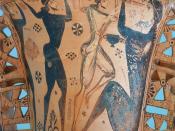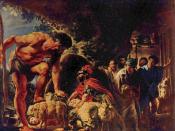A guest in need enters a house, interrupting the host and his company during a feast. The guest believed to be a god or a beggar, either way is welcomed to feast and stay in the host's lavish house. Hospitality is an important reoccurring theme in the novel, The Odyssey by Robert Fitzgerald. Hospitality was seen as an important obligation in Ancient Greece, serving as a means of communication and often as a test for the gods. The disregards of giving hospitality, or disrespecting received hospitality, persistently lead to harsh consequences.
In the novel the Odyssey, hospitality was constantly shown to visitors, they were welcomed to feast and showered in luxuries. These generous acts of hospitality were custom in ancient Greek civilization, a means of communication and essential to satisfy the gods. Hospitality was considered an obligation in ancient Greek times, one was both expected to supply and treat hospitality appropriately.
When Eteoneus, the King's assistant asked whether he should welcome Telemakos and Athena, Melenelos replied "Could we have made it home again, if no other men had never fed us given us lodging." Ancient Greece was a group of secluded civilizations, because of the unpredictable sea and the harsh terrain communication was a difficult business, news of the outside world h through guests was welcomed and well rewarded. Telemakhos had received no word of his long lost father for twenty years, so when Athena arrives disguised, she is welcomed for hope of news of Odysseys, "Greetings, stranger! Welcome to our feast. There will be time to tell your errand later". Greek hospitality often seemed overwhelming leading to believe that hospitality was not shown through pure decency, but often to satisfy the gods. Because gods were able to walk among earth, hosts had no certain idea if their guests...


